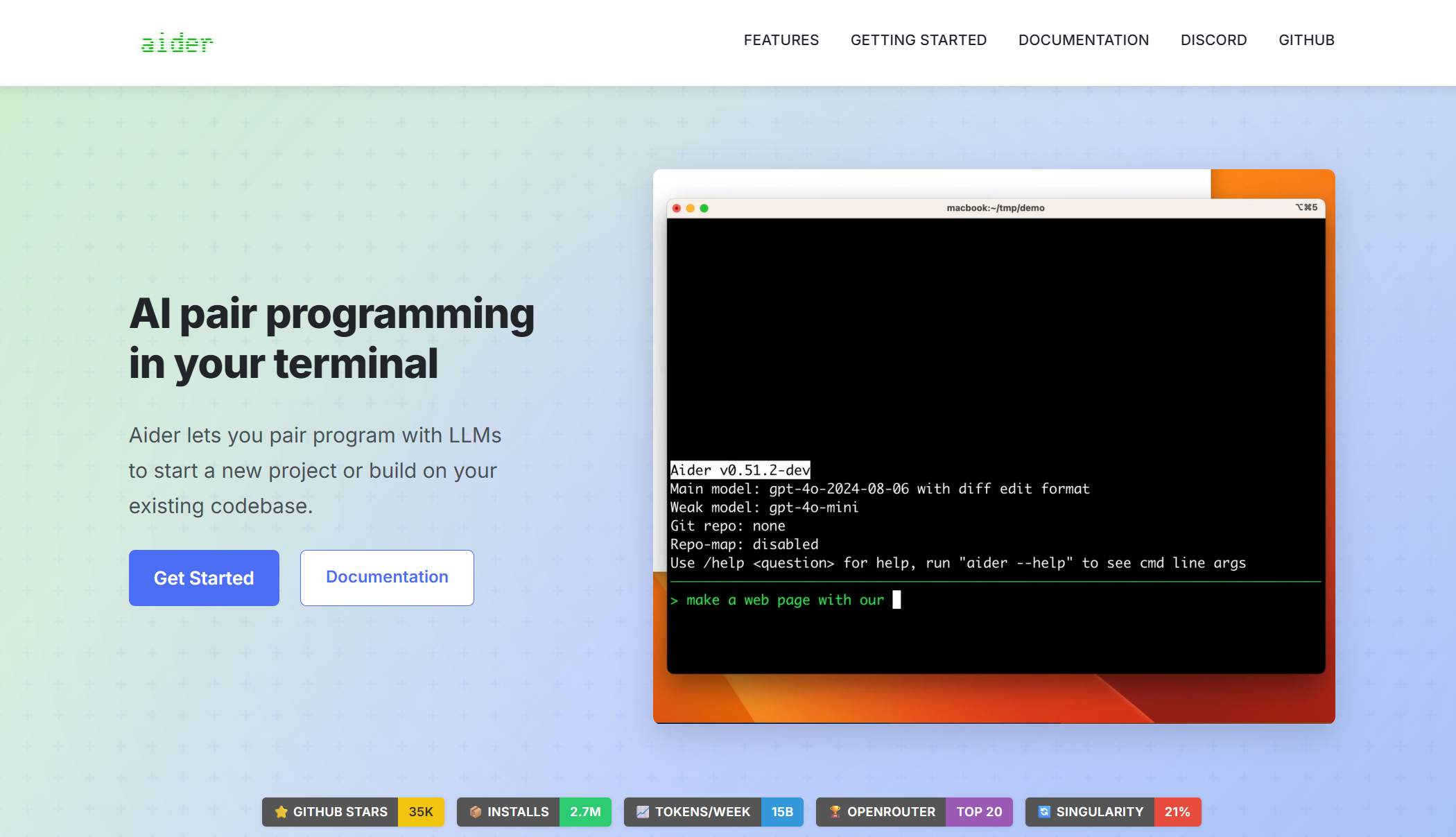
- Software Developers & Engineers: Automate coding tasks, refactors, and multi-file edits using conversational prompts.
- Technical Leads & Architects: Enforce patterns and structure via AI workflows while preserving code standards.
- Open-Source Contributors & DevOps Teams: Customize agent workflows, incorporate local LLMs, and extend via scripting.
- Learners & Educators: Use voice-to-code inputs, natural language commands, and AI-assisted debugging walkthroughs.
- Budget-Conscious Projects: Operates via pay-as-you-go LLM hosting—no proprietary subscription needed, processing files for as low as $0.007 per file.
How to Use Aider.chat?
- Install Quickly: Run pip install aider-install or use system/scripted installers (macOS, Linux, Windows).
- Initialize Chat Sessions: Launch Aider in a Git repo with specific files or entire project; it first maps your codebase for contextual awareness.
- Chat & Edit with AI: Issue natural language commands like “add a search feature,” “refactor this module,” or “write tests.” AI replies with diffs and optional auto-commits.
- Manage Changes and Review: Use /diff, /undo, or Git tools to inspect changes; disable auto-commit if preferred.
- Switch Models On the Fly: Toggle between models (e.g. GPT 4o, Claude, DeepSeek or local models) using /model.
- True AI Pair Programming in Terminal: Conversational editing across multi-files, without copy/paste, fully integrated with Git workflows.
- Supports Large Codebases: Builds a repo map to effectively understand and operate across projects of any size.
- Cost-Efficient AI Coding: Pay per file processed via the LLM provider; users report low per-charge cost (~$0.007/file).
- Voice-to-Code & Visual Context: Supports voice comands, and you can upload images or web context to guide AI behavior.
- GPT-powered, terminal-native development boosts productivity with minimal manual effort.
- Auto-commits and diffs simplify reviewability when collaborating or using CI workflows.
- Supports open-source flexibility—local LLMs, model choice, and scriptable customization.
- Strong reliance on Git workflows; novice users may need time to adapt.
- Terminal-first interface lacks point-and-click ease of GUI-based IDE assistants.
- AI can sometimes apply unintended changes; requires careful prompt design and occasional manual review.
Custom
Custom
Proud of the love you're getting? Show off your AI Toolbook reviews—then invite more fans to share the love and build your credibility.
Add an AI Toolbook badge to your site—an easy way to drive followers, showcase updates, and collect reviews. It's like a mini 24/7 billboard for your AI.
Reviews
Rating Distribution
Average score
Popular Mention
FAQs
Similar AI Tools
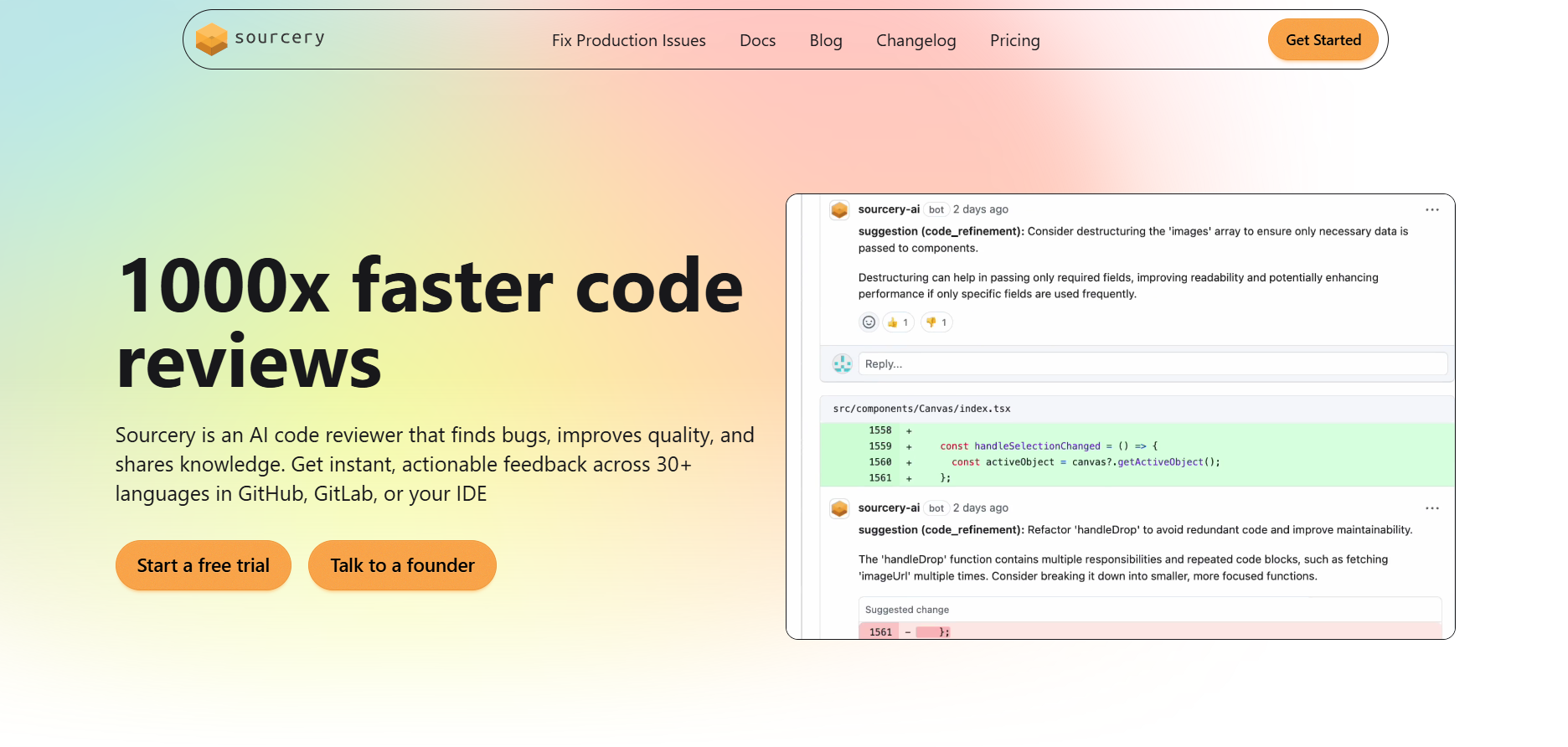

Sourcery
Sourcery is an AI-powered coding assistant specifically designed to help developers write cleaner, more efficient Python code. It integrates seamlessly with your IDE or codebase to suggest real-time refactorings, generate docstrings, and enforce best practices automatically. Sourcery acts as an automated code reviewer, improving code quality and reducing technical debt across teams and projects.


Sourcery
Sourcery is an AI-powered coding assistant specifically designed to help developers write cleaner, more efficient Python code. It integrates seamlessly with your IDE or codebase to suggest real-time refactorings, generate docstrings, and enforce best practices automatically. Sourcery acts as an automated code reviewer, improving code quality and reducing technical debt across teams and projects.


Sourcery
Sourcery is an AI-powered coding assistant specifically designed to help developers write cleaner, more efficient Python code. It integrates seamlessly with your IDE or codebase to suggest real-time refactorings, generate docstrings, and enforce best practices automatically. Sourcery acts as an automated code reviewer, improving code quality and reducing technical debt across teams and projects.
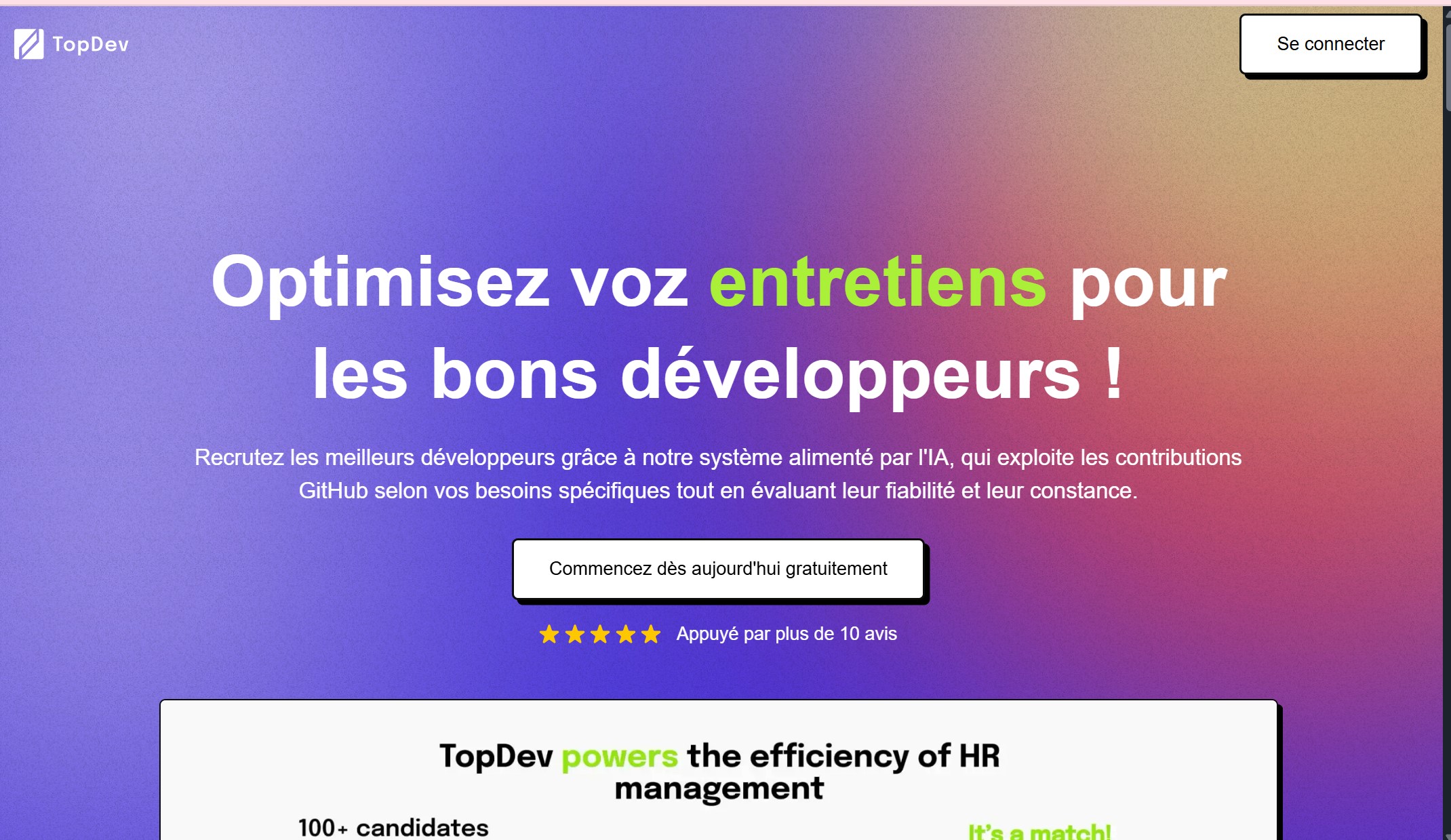
TopDev
TopDev.online is an AI-powered developer toolkit and resource hub designed to streamline coding, debugging, and learning for programmers of all levels. It offers AI-assisted code generation, real-time error fixing, and curated learning paths to help developers build projects faster and more efficiently.

TopDev
TopDev.online is an AI-powered developer toolkit and resource hub designed to streamline coding, debugging, and learning for programmers of all levels. It offers AI-assisted code generation, real-time error fixing, and curated learning paths to help developers build projects faster and more efficiently.

TopDev
TopDev.online is an AI-powered developer toolkit and resource hub designed to streamline coding, debugging, and learning for programmers of all levels. It offers AI-assisted code generation, real-time error fixing, and curated learning paths to help developers build projects faster and more efficiently.
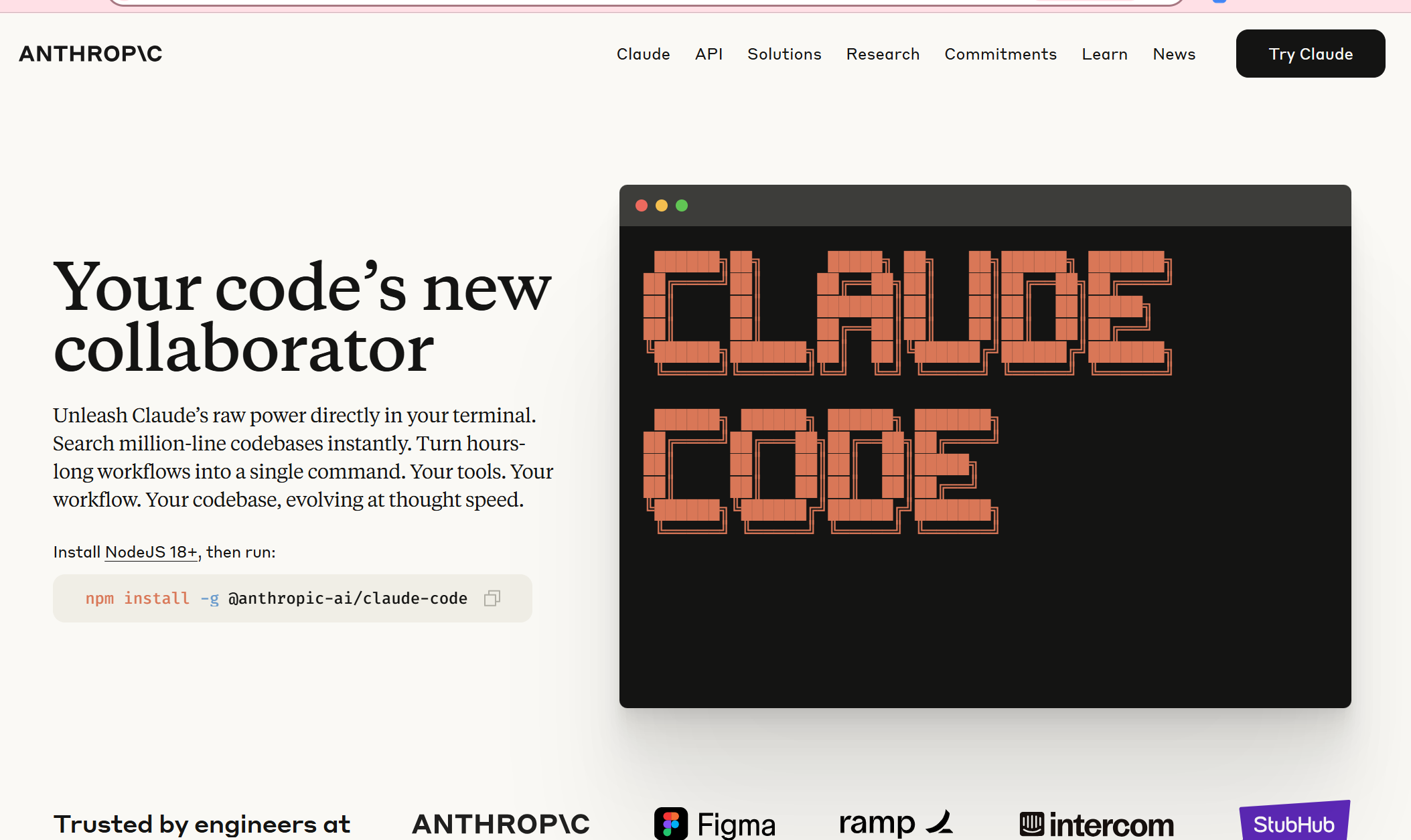
Claude Code
Claude Code is an agentic coding assistant developed by Anthropic. Living in your terminal (or IDE), it comprehends your entire codebase and executes routine tasks—like writing code, debugging, explaining logic, and managing Git workflows—all via natural language commands .

Claude Code
Claude Code is an agentic coding assistant developed by Anthropic. Living in your terminal (or IDE), it comprehends your entire codebase and executes routine tasks—like writing code, debugging, explaining logic, and managing Git workflows—all via natural language commands .

Claude Code
Claude Code is an agentic coding assistant developed by Anthropic. Living in your terminal (or IDE), it comprehends your entire codebase and executes routine tasks—like writing code, debugging, explaining logic, and managing Git workflows—all via natural language commands .
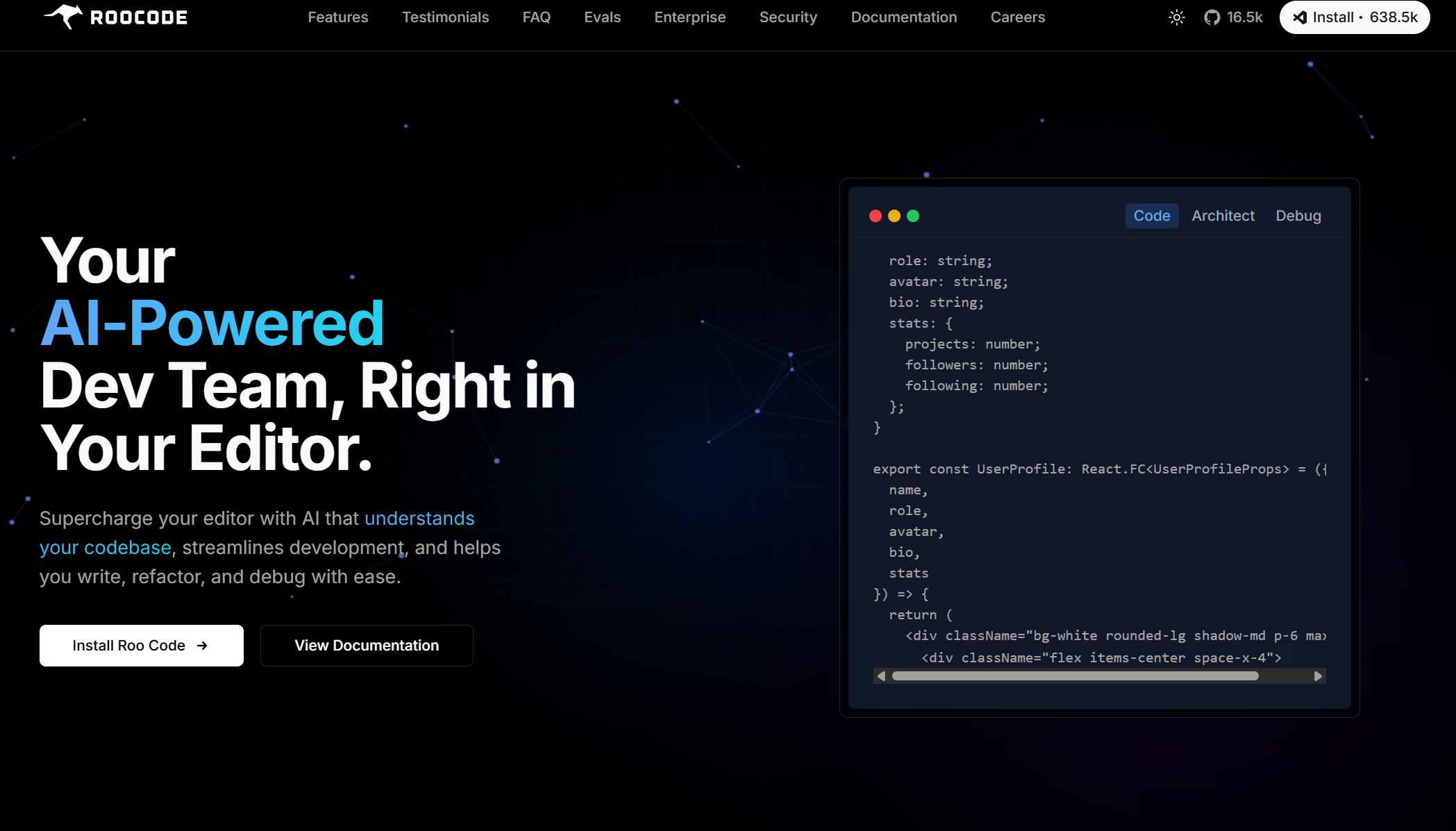

RooCode
Roo Code (formerly Roo Cline) is an open-source, AI-powered development assistant built directly into Visual Studio Code. Acting like a full-stack “AI dev team,” it helps you plan, write, and refactor code across multiple files, run terminal commands, launch browsers, and debug—all from within your editor.


RooCode
Roo Code (formerly Roo Cline) is an open-source, AI-powered development assistant built directly into Visual Studio Code. Acting like a full-stack “AI dev team,” it helps you plan, write, and refactor code across multiple files, run terminal commands, launch browsers, and debug—all from within your editor.


RooCode
Roo Code (formerly Roo Cline) is an open-source, AI-powered development assistant built directly into Visual Studio Code. Acting like a full-stack “AI dev team,” it helps you plan, write, and refactor code across multiple files, run terminal commands, launch browsers, and debug—all from within your editor.


Manus AI
ManusAI is an AI-powered code assistant built to help developers write, understand, and debug code faster and more efficiently. With deep code comprehension, custom workflows, and seamless IDE integrations, ManusAI acts like a virtual senior engineer—guiding you through complex logic, code reviews, and refactoring tasks. Whether you’re writing new code or diving into a legacy codebase, ManusAI accelerates your productivity with precision. Essentially, Manus AI aims to be an "intelligent hand" that translates user intent directly into action, automating tasks that typically require human management. It's currently accessible via an invitation-only beta.


Manus AI
ManusAI is an AI-powered code assistant built to help developers write, understand, and debug code faster and more efficiently. With deep code comprehension, custom workflows, and seamless IDE integrations, ManusAI acts like a virtual senior engineer—guiding you through complex logic, code reviews, and refactoring tasks. Whether you’re writing new code or diving into a legacy codebase, ManusAI accelerates your productivity with precision. Essentially, Manus AI aims to be an "intelligent hand" that translates user intent directly into action, automating tasks that typically require human management. It's currently accessible via an invitation-only beta.


Manus AI
ManusAI is an AI-powered code assistant built to help developers write, understand, and debug code faster and more efficiently. With deep code comprehension, custom workflows, and seamless IDE integrations, ManusAI acts like a virtual senior engineer—guiding you through complex logic, code reviews, and refactoring tasks. Whether you’re writing new code or diving into a legacy codebase, ManusAI accelerates your productivity with precision. Essentially, Manus AI aims to be an "intelligent hand" that translates user intent directly into action, automating tasks that typically require human management. It's currently accessible via an invitation-only beta.
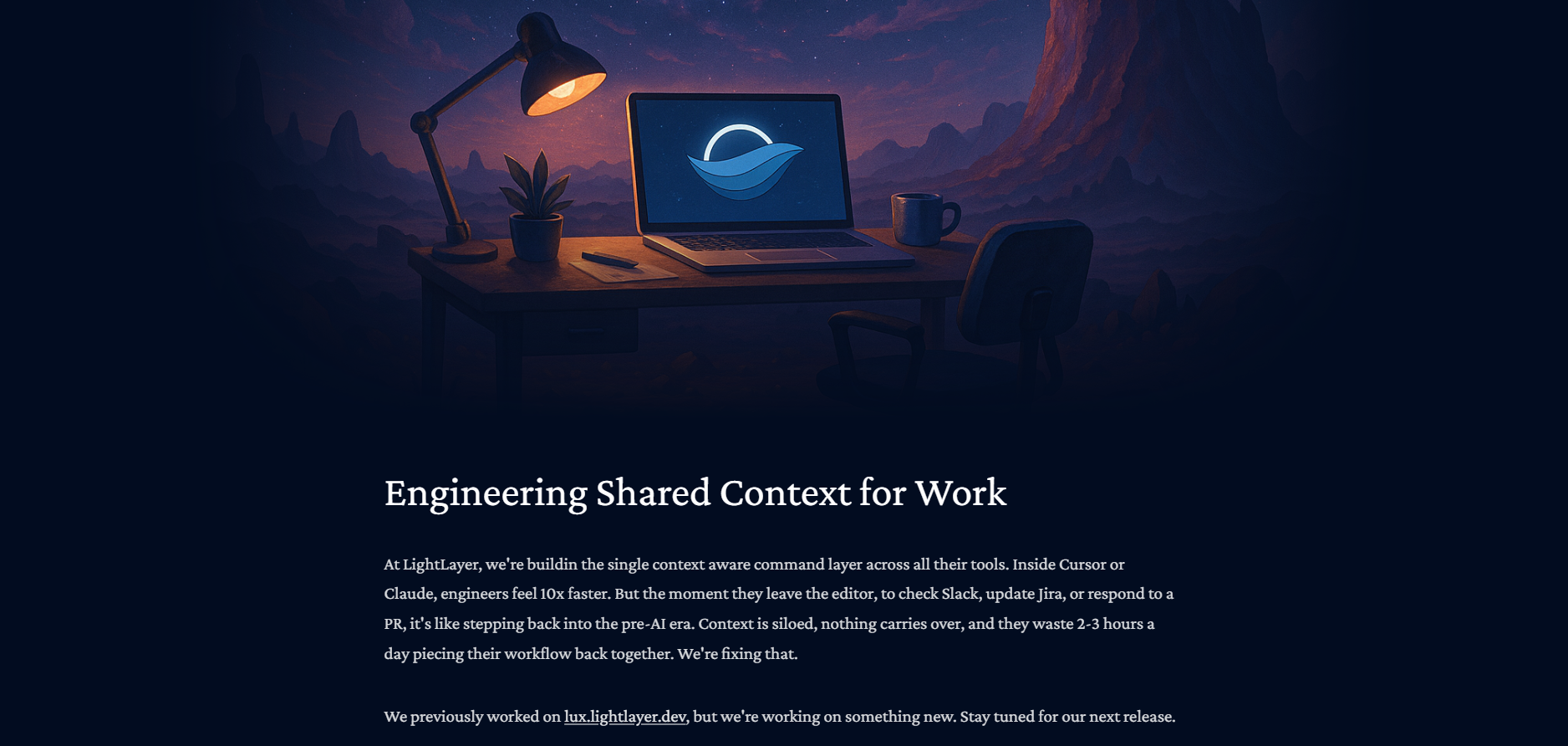

LightLayer Dev
LightLayer is a voice-first AI code review workspace that empowers engineers to review code up to five times faster. By speaking naturally while highlighting code, developers can generate structured feedback without typing. The platform is designed to simulate live interactions with senior peers, offering contextual AI assistance that understands codebases and aligns with existing workflows.


LightLayer Dev
LightLayer is a voice-first AI code review workspace that empowers engineers to review code up to five times faster. By speaking naturally while highlighting code, developers can generate structured feedback without typing. The platform is designed to simulate live interactions with senior peers, offering contextual AI assistance that understands codebases and aligns with existing workflows.


LightLayer Dev
LightLayer is a voice-first AI code review workspace that empowers engineers to review code up to five times faster. By speaking naturally while highlighting code, developers can generate structured feedback without typing. The platform is designed to simulate live interactions with senior peers, offering contextual AI assistance that understands codebases and aligns with existing workflows.
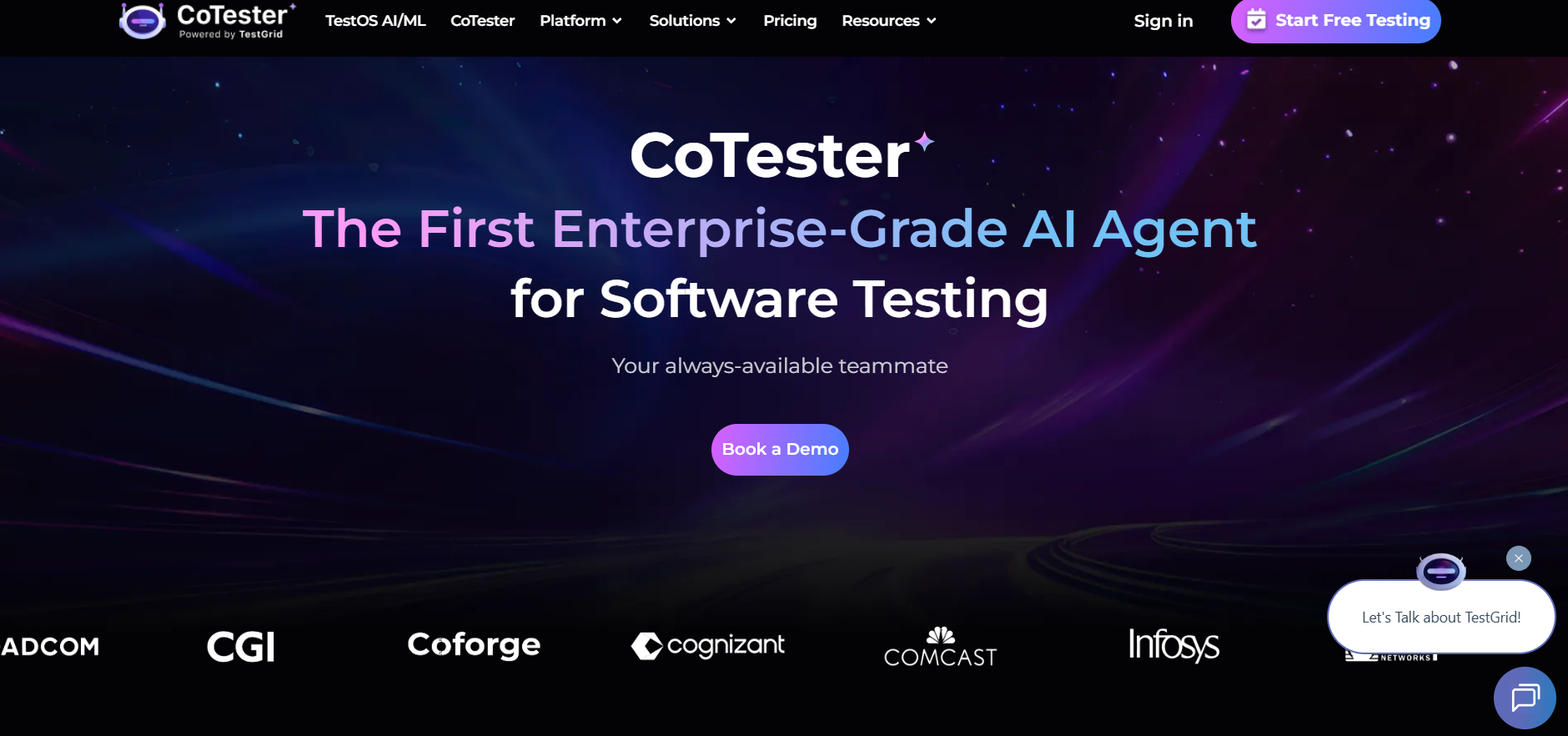
TestGrid CoTester is an AI-driven software testing assistant embedded within the TestGrid platform, built to automate test generation, execution, bug detection, and workflow management. Pretrained on core software testing principles and frameworks, CoTester integrates with your stack to draft manual and automated test cases, run them across real browsers and devices, detect performance and functional issues, and even assign bugs and tasks to team members. Over time, it learns from your inputs to better align with your project’s architecture, tech stack, and team conventions.


CoTester by TestGr..
TestGrid CoTester is an AI-driven software testing assistant embedded within the TestGrid platform, built to automate test generation, execution, bug detection, and workflow management. Pretrained on core software testing principles and frameworks, CoTester integrates with your stack to draft manual and automated test cases, run them across real browsers and devices, detect performance and functional issues, and even assign bugs and tasks to team members. Over time, it learns from your inputs to better align with your project’s architecture, tech stack, and team conventions.


CoTester by TestGr..
TestGrid CoTester is an AI-driven software testing assistant embedded within the TestGrid platform, built to automate test generation, execution, bug detection, and workflow management. Pretrained on core software testing principles and frameworks, CoTester integrates with your stack to draft manual and automated test cases, run them across real browsers and devices, detect performance and functional issues, and even assign bugs and tasks to team members. Over time, it learns from your inputs to better align with your project’s architecture, tech stack, and team conventions.
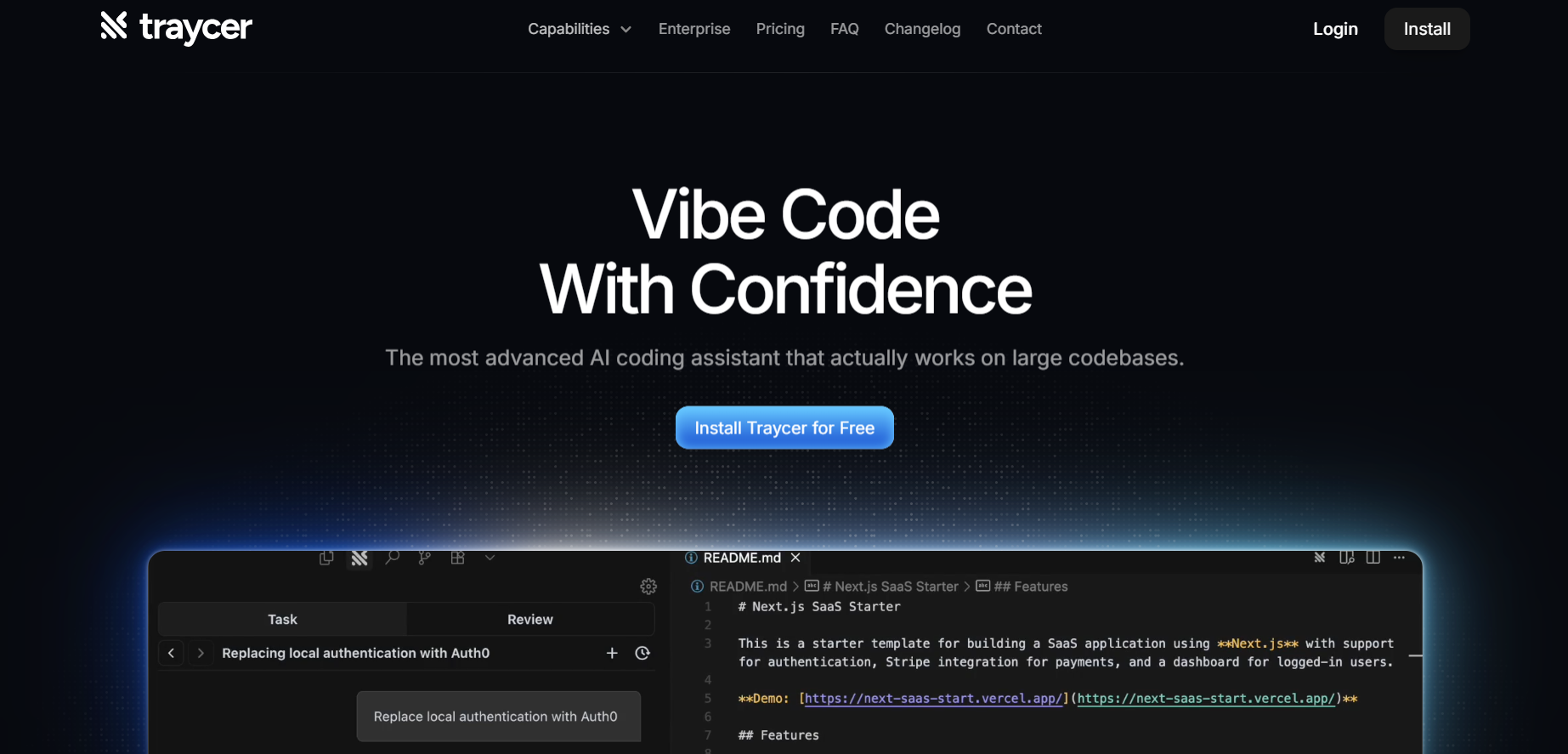

Traycer
Traycer AI is an advanced coding assistant focused on planning, executing, and reviewing code changes in large projects. Rather than immediately generating code, it begins each task by creating detailed, structured plans that break down high-level intent into manageable actions. From there, it allows users to iterate on these plans, then hand them off to AI agents like Claude Code, Cursor, or others to implement the changes. Traycer also includes functionality to verify AI-generated changes against the existing codebase to catch errors early. It integrates with development environments (VSCode, Cursor, Windsurf) and supports features like “Ticket Assist,” which turns GitHub issues into executable plans directly in your IDE.


Traycer
Traycer AI is an advanced coding assistant focused on planning, executing, and reviewing code changes in large projects. Rather than immediately generating code, it begins each task by creating detailed, structured plans that break down high-level intent into manageable actions. From there, it allows users to iterate on these plans, then hand them off to AI agents like Claude Code, Cursor, or others to implement the changes. Traycer also includes functionality to verify AI-generated changes against the existing codebase to catch errors early. It integrates with development environments (VSCode, Cursor, Windsurf) and supports features like “Ticket Assist,” which turns GitHub issues into executable plans directly in your IDE.


Traycer
Traycer AI is an advanced coding assistant focused on planning, executing, and reviewing code changes in large projects. Rather than immediately generating code, it begins each task by creating detailed, structured plans that break down high-level intent into manageable actions. From there, it allows users to iterate on these plans, then hand them off to AI agents like Claude Code, Cursor, or others to implement the changes. Traycer also includes functionality to verify AI-generated changes against the existing codebase to catch errors early. It integrates with development environments (VSCode, Cursor, Windsurf) and supports features like “Ticket Assist,” which turns GitHub issues into executable plans directly in your IDE.
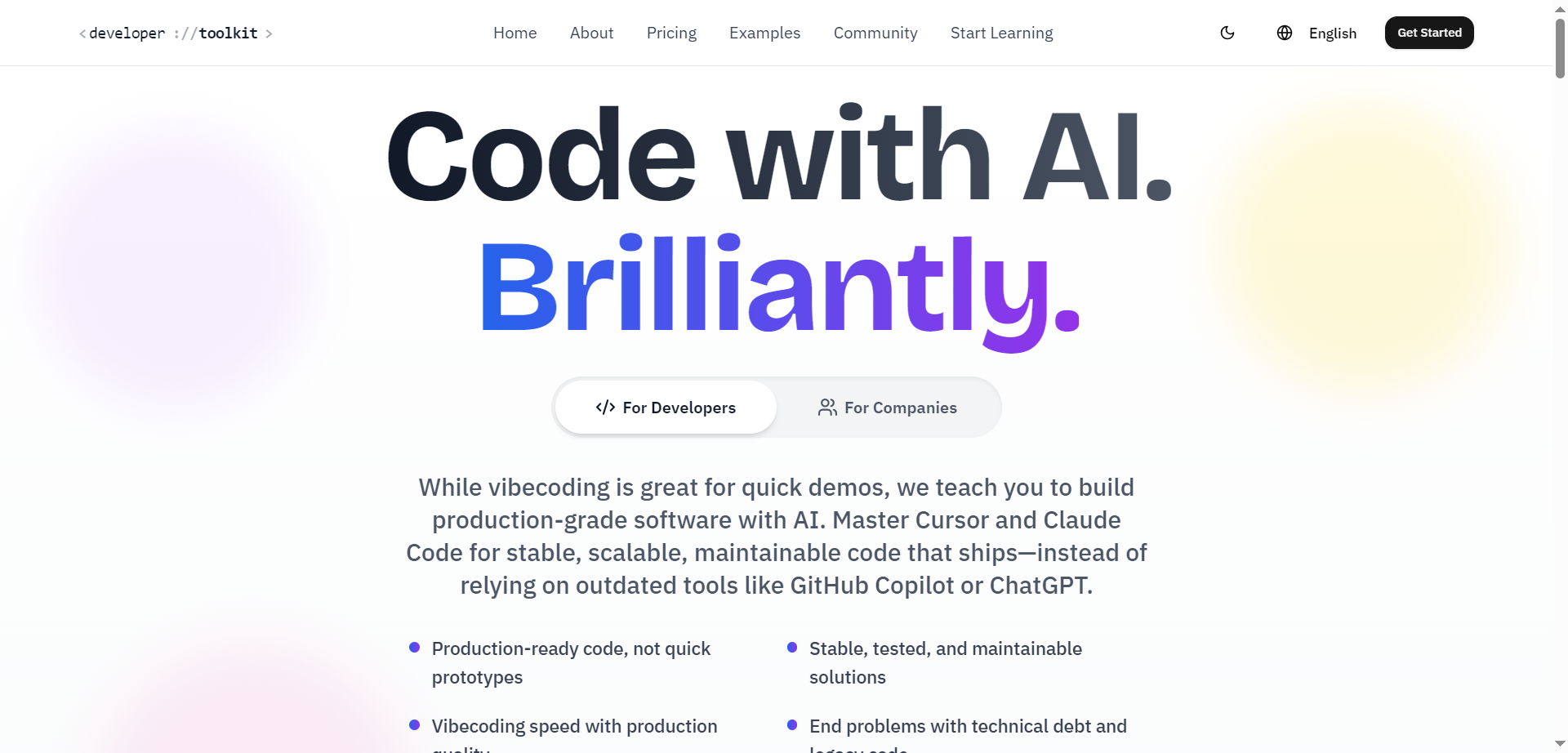
Developer Toolkit
DeveloperToolkit.ai is an advanced AI-assisted development platform designed to help developers build production-grade, scalable, and maintainable software. It leverages powerful models like Claude Code and Cursor to generate production-ready code that’s secure, tested, and optimized for real-world deployment. Unlike tools that stop at quick prototypes, DeveloperToolkit.ai focuses on long-term code quality, maintainability, and best practices. Whether writing API endpoints, components, or full-fledged systems, it accelerates the entire development process while ensuring cleaner architectures and stable results fit for teams that ship with confidence.

Developer Toolkit
DeveloperToolkit.ai is an advanced AI-assisted development platform designed to help developers build production-grade, scalable, and maintainable software. It leverages powerful models like Claude Code and Cursor to generate production-ready code that’s secure, tested, and optimized for real-world deployment. Unlike tools that stop at quick prototypes, DeveloperToolkit.ai focuses on long-term code quality, maintainability, and best practices. Whether writing API endpoints, components, or full-fledged systems, it accelerates the entire development process while ensuring cleaner architectures and stable results fit for teams that ship with confidence.

Developer Toolkit
DeveloperToolkit.ai is an advanced AI-assisted development platform designed to help developers build production-grade, scalable, and maintainable software. It leverages powerful models like Claude Code and Cursor to generate production-ready code that’s secure, tested, and optimized for real-world deployment. Unlike tools that stop at quick prototypes, DeveloperToolkit.ai focuses on long-term code quality, maintainability, and best practices. Whether writing API endpoints, components, or full-fledged systems, it accelerates the entire development process while ensuring cleaner architectures and stable results fit for teams that ship with confidence.
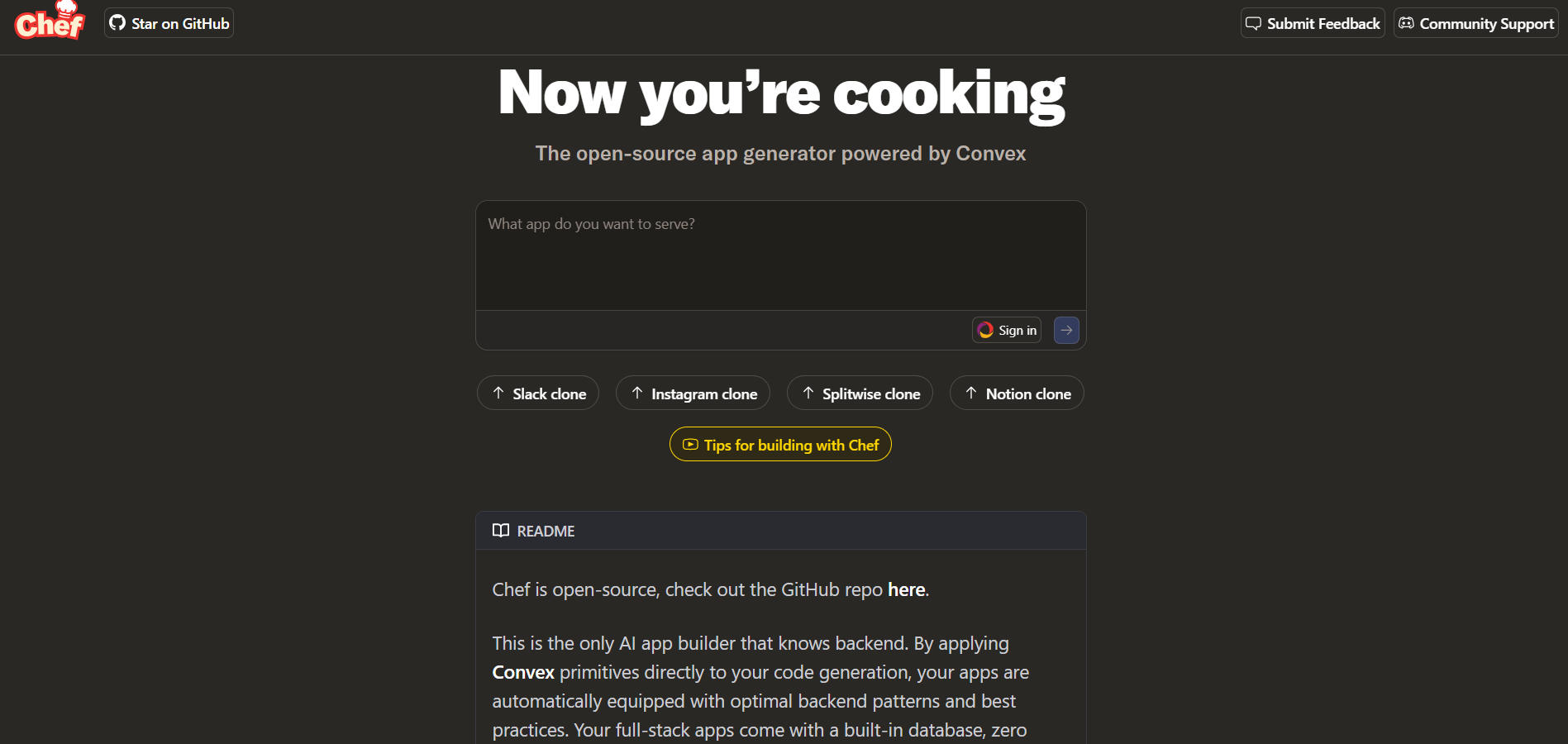

Chef
Chef by Convex is an AI-powered development assistant built to help developers create, test, and deploy web applications faster using natural language prompts. Integrated with Convex’s backend-as-a-service platform, Chef automates code generation, database setup, and API creation, enabling developers to move from concept to functional prototype within minutes. The tool understands developer intent, allowing users to describe what they want and instantly receive production-ready code snippets. With collaborative features and integrated testing environments, Chef by Convex simplifies modern app development for both individuals and teams, combining AI intelligence with backend scalability.


Chef
Chef by Convex is an AI-powered development assistant built to help developers create, test, and deploy web applications faster using natural language prompts. Integrated with Convex’s backend-as-a-service platform, Chef automates code generation, database setup, and API creation, enabling developers to move from concept to functional prototype within minutes. The tool understands developer intent, allowing users to describe what they want and instantly receive production-ready code snippets. With collaborative features and integrated testing environments, Chef by Convex simplifies modern app development for both individuals and teams, combining AI intelligence with backend scalability.


Chef
Chef by Convex is an AI-powered development assistant built to help developers create, test, and deploy web applications faster using natural language prompts. Integrated with Convex’s backend-as-a-service platform, Chef automates code generation, database setup, and API creation, enabling developers to move from concept to functional prototype within minutes. The tool understands developer intent, allowing users to describe what they want and instantly receive production-ready code snippets. With collaborative features and integrated testing environments, Chef by Convex simplifies modern app development for both individuals and teams, combining AI intelligence with backend scalability.
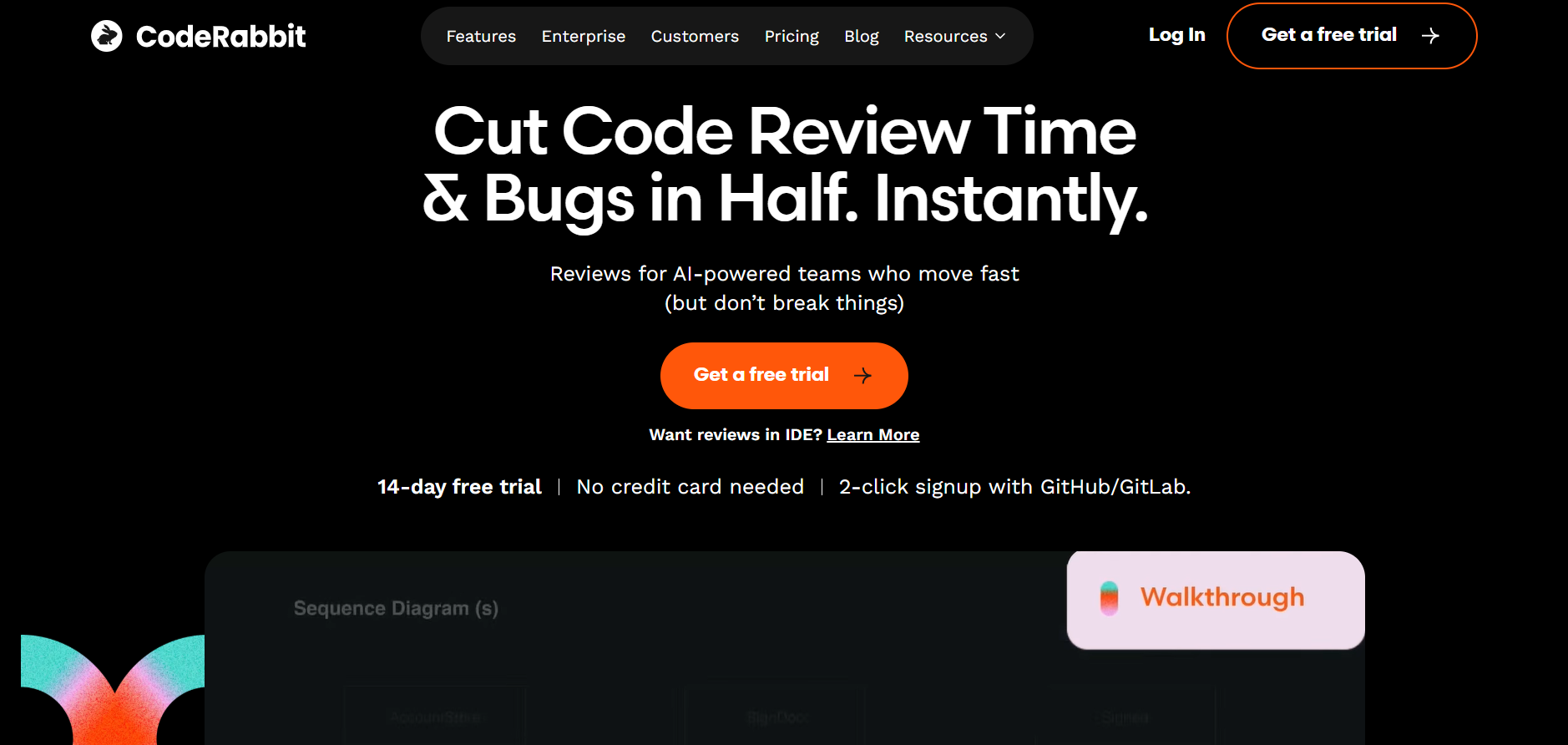

Coderabbit AI
CodeRabbit AI is an intelligent code review assistant designed to automate software review processes, identify bugs, and improve code quality using machine learning. It integrates directly with GitHub and other version control systems to provide real-time analysis, review comments, and improvement suggestions. By mimicking human reviewer logic, CodeRabbit helps development teams maintain code standards while reducing time spent on manual reviews. Its AI models are trained on best coding practices, ensuring that every commit is efficient, secure, and optimized for performance.


Coderabbit AI
CodeRabbit AI is an intelligent code review assistant designed to automate software review processes, identify bugs, and improve code quality using machine learning. It integrates directly with GitHub and other version control systems to provide real-time analysis, review comments, and improvement suggestions. By mimicking human reviewer logic, CodeRabbit helps development teams maintain code standards while reducing time spent on manual reviews. Its AI models are trained on best coding practices, ensuring that every commit is efficient, secure, and optimized for performance.


Coderabbit AI
CodeRabbit AI is an intelligent code review assistant designed to automate software review processes, identify bugs, and improve code quality using machine learning. It integrates directly with GitHub and other version control systems to provide real-time analysis, review comments, and improvement suggestions. By mimicking human reviewer logic, CodeRabbit helps development teams maintain code standards while reducing time spent on manual reviews. Its AI models are trained on best coding practices, ensuring that every commit is efficient, secure, and optimized for performance.
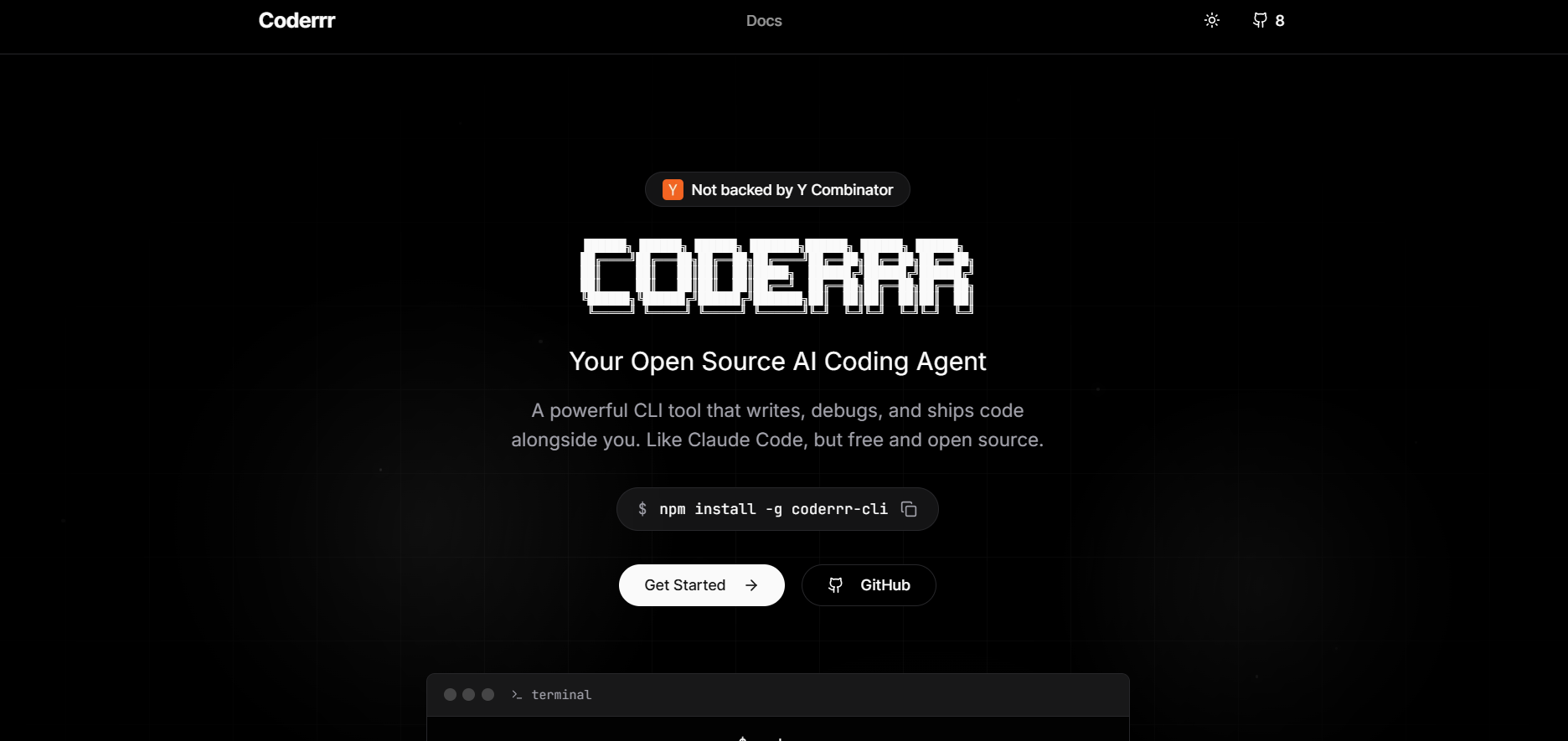
coderrr
Coderrr is an open-source AI coding agent delivered as a powerful command-line interface tool that works alongside developers to write, debug, and ship code efficiently. Designed as a free and open alternative to proprietary AI coding assistants, Coderrr integrates directly into the developer workflow without locking users into closed ecosystems. It assists with code generation, error diagnosis, refactoring, and implementation tasks directly from the terminal, making it especially useful for developers who prefer CLI-first environments. By being fully open source, Coderrr allows transparency, customization, and community-driven improvements while still delivering practical AI-assisted development capabilities.

coderrr
Coderrr is an open-source AI coding agent delivered as a powerful command-line interface tool that works alongside developers to write, debug, and ship code efficiently. Designed as a free and open alternative to proprietary AI coding assistants, Coderrr integrates directly into the developer workflow without locking users into closed ecosystems. It assists with code generation, error diagnosis, refactoring, and implementation tasks directly from the terminal, making it especially useful for developers who prefer CLI-first environments. By being fully open source, Coderrr allows transparency, customization, and community-driven improvements while still delivering practical AI-assisted development capabilities.

coderrr
Coderrr is an open-source AI coding agent delivered as a powerful command-line interface tool that works alongside developers to write, debug, and ship code efficiently. Designed as a free and open alternative to proprietary AI coding assistants, Coderrr integrates directly into the developer workflow without locking users into closed ecosystems. It assists with code generation, error diagnosis, refactoring, and implementation tasks directly from the terminal, making it especially useful for developers who prefer CLI-first environments. By being fully open source, Coderrr allows transparency, customization, and community-driven improvements while still delivering practical AI-assisted development capabilities.
Editorial Note
This page was researched and written by the ATB Editorial Team. Our team researches each AI tool by reviewing its official website, testing features, exploring real use cases, and considering user feedback. Every page is fact-checked and regularly updated to ensure the information stays accurate, neutral, and useful for our readers.
If you have any suggestions or questions, email us at hello@aitoolbook.ai
